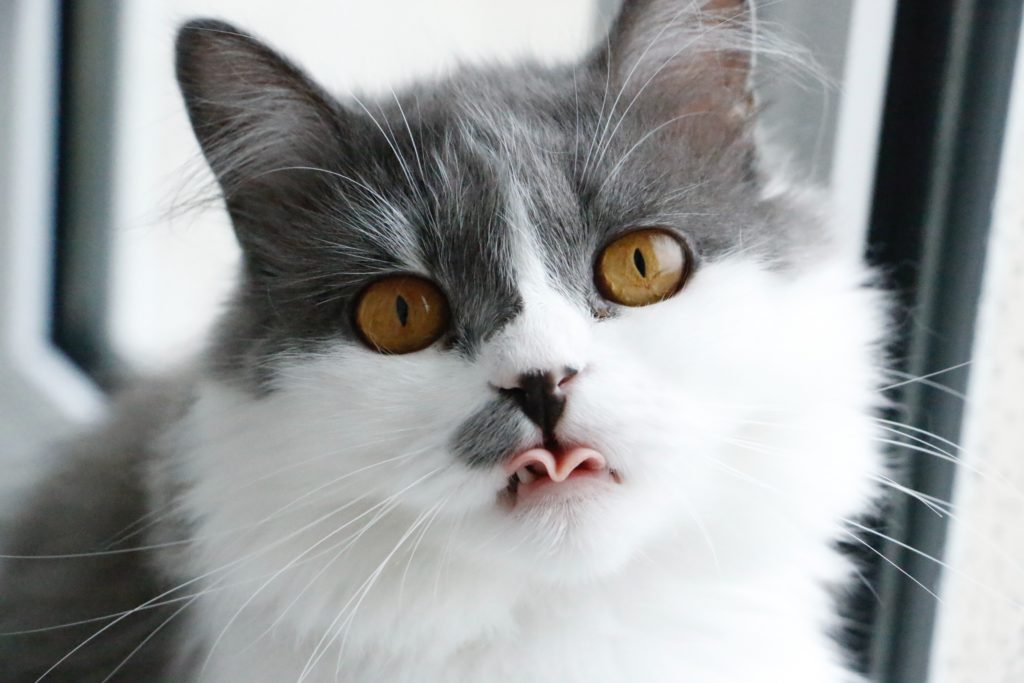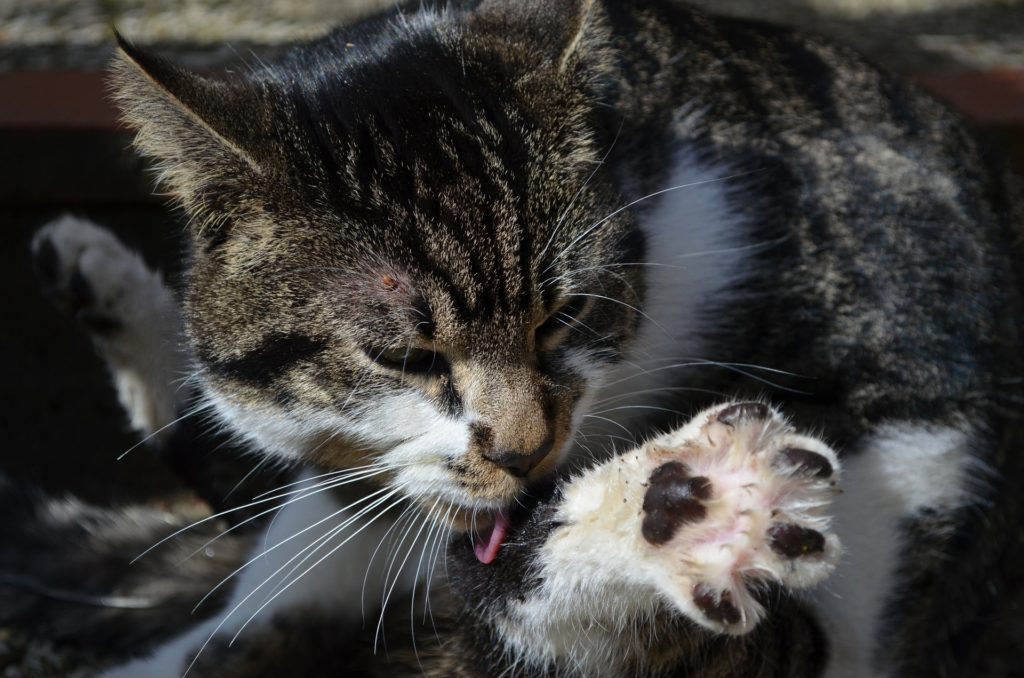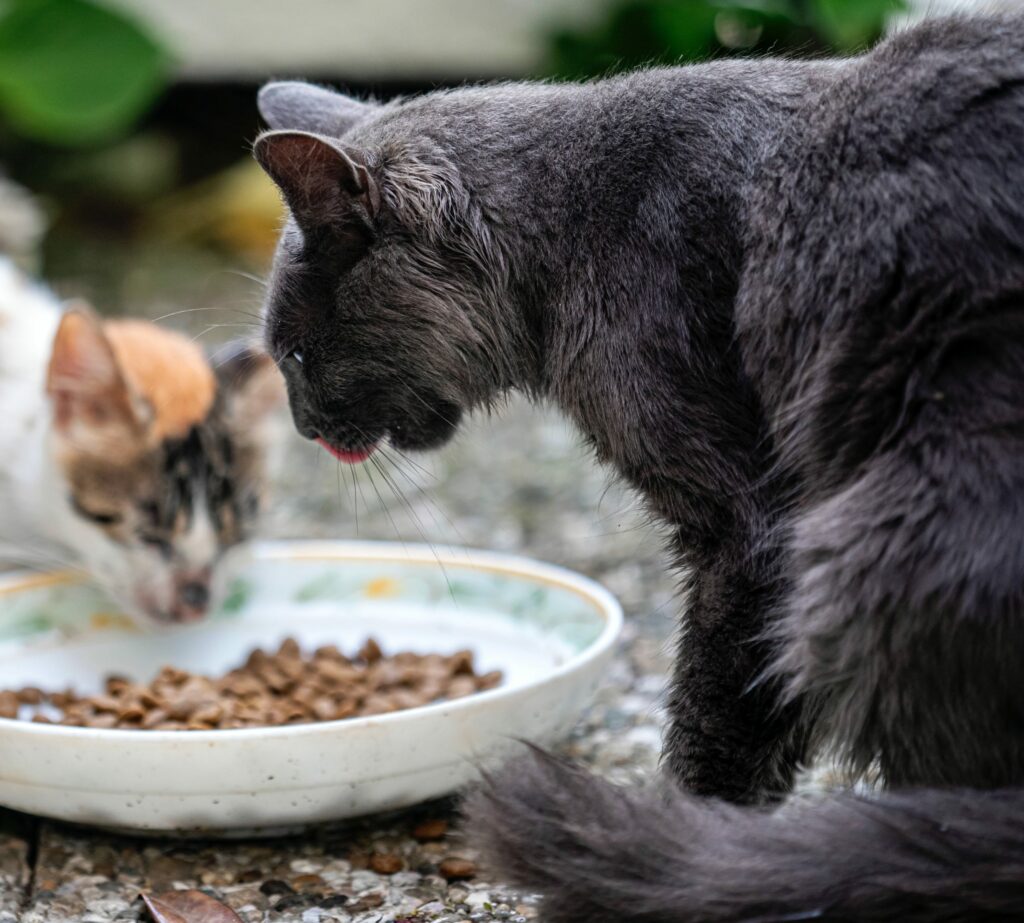By this behavior of preening themselves after eating, cats are trying to get rid of their food smell to avoid attracting predators. Likewise, it is also a part to maintain general hygiene.
Cats own grooming is very important for them, it takes up a lot of their time. Especially after sleeping, playing and eating, cats groom themselves very extensively. This behavior cats learn from their mother from an early age and is an innate instinct to avoid attracting large predators after eating.
Why do cats groom themselves in the first place?
Cats groom themselves to calm themselves in stressful situations, to remove parasites from their fur, and to improve their skin.
Cats are wonderfully good at cleaning themselves and keeping themselves clean. Because of their well-equipped tongues, which have small barbs, they can remove the smallest particles of dirt from their fur.

Cats tongues have small barbs, with which they can remove the smallest remains of food.
Likewise, their velvet paws serve very well as washcloths, which they briefly moisten with their tongues and use to scrub their noses and faces clean.
That cats can clean themselves so well has the following reasons:
- Social purposes
- Ability to calm themselves in stressful situations
- To improve their own skin
- To remove parasites or other dirt particles from their fur
If you’d like to know how to help your cat groom, you can learn this and much more in our exciting article, How do I groom a cat?
Why do cats lick their mouths after eating?
Since the mouth area needs the most cleaning, your cat will do this first, without using her paws. Also very often the lips are cleaned very thoroughly.
Especially after eating, the mouth and lips are cleaned first. This is part of the cat’s self-cleaning routine that comes with eating. Your cat’s tongue will begin cleaning immediately, even before your cat has sat down for the proper post meal grooming ritual.
The mouth area is the area that needs the most cleaning and is also the easiest for your cat to clean without having to use her paws.
Why do cats lick their paws after eating?
The paws are cleaned very thoroughly to remove all food odors from the body. This is to prevent your cat from attracting the attention of other predators.
After eating, cats clean their paws several times and also use them to clean their ears. When the head area is cleaned, your cat turns to her paws and cleans them very thoroughly. She will also chew on her paws to get to the hard-to-reach places on her paws.
Cleaning the paws is very important to your cat to remove all food odors from her body so that no other predators can be attracted.
Want to know how long wet food lasts when it’s open? We’ll give you the answer in our great article How long does open wet food for cats last?
What does normal grooming look like?
You should be familiar with what normal and abnormal behavior looks like in your cat. Knowing the difference can help you spot early signs of illness or other problems your cat may have.

Your cat has its own methods and style when it comes to its grooming habits. It’s best to observe your cat grooming itself on a daily basis.
Cat grooming after eating is very important for cats to not spread food odors.
Your cat may spend 5-25% of its day grooming; this is normal. Cats that live together often groom not only each other, but themselves as well. Your cat may even try to groom them.
Your cat will groom her entire body, usually starting with her face and front paws, moving down her body and then to her rear limbs.
What is considered too much grooming?
Most cats spend 5-25% of their day grooming. If you notice bald patches on the fur, it may be a sign that your cat is obsessively grooming. This can happen due to too much stress or a change in environment.
The best way to detect compulsive grooming in your cat is to watch them do it several times and deviate from their usual basic grooming.
Excessive grooming, or psychogenic alopecia, is a compulsive behavior that occurs in some domestic cats. This is when grooming overrides other activities and becomes non-functional.
Should you notice bald patches or areas on your cat’s coat where the hair is broken, it may be a sign of excessive grooming.
This habit can lead to injuries on the paws, tail and skin all over the body. The increased risk of skin infections and rashes makes excessive grooming dangerous to your cat’s health.
Causes for compulsive and excessive grooming of your cat could be increased stress such as a move or a new family member. In this case, it is advisable to seek veterinary advice.
Here we have summarized our most popular posts for you in a great overview:
- Cat scratches at wallpaper
- Cat does not like treats
- How to keep ants out of the cat food
- Why do cats groom themselves after eating?
- Cat only wants to eat
- Is there food envy in cats?
- Cat wants only wet food, is this harmful?
- How long does open wet cat food keep?
- Which cat breeds are suitable for outdoor use?
- How to feed outdoor cats?
- Strange cat comes again and again
Summary – Why do cats clean themselves after eating?
By this behavior of preening themselves after eating, cats are trying to get rid of their food smell to avoid attracting predators. Likewise, it is also a part of maintaining general hygiene.
Cats groom themselves to calm themselves in stressful situations, to remove parasites from their fur, and to improve their skin.
Since the mouth area needs the most cleaning, your cat will do this first without having to use her paws. Likewise, the lips are very often cleaned very thoroughly in the process.
The paws are cleaned very thoroughly to remove all food odors from the body. This is to prevent your cat from attracting the attention of other predators.
Most cats spend 5-25% of their day grooming. If you notice bald patches on the fur, it may be a sign that your cat is brushing compulsively. This can happen due to too much stress or a change in environment.

